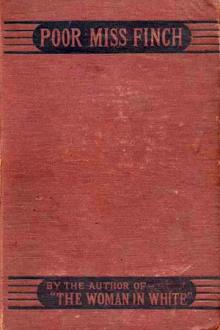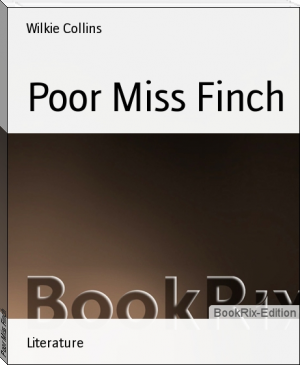Poor Miss Finch - Wilkie Collins (best books to read for beginners txt) 📗

- Author: Wilkie Collins
- Performer: -
Book online «Poor Miss Finch - Wilkie Collins (best books to read for beginners txt) 📗». Author Wilkie Collins
In those uncompromising words, the Englishman delivered his opinion.
Lucilla’s hand closed fast on mine. “Cruel! cruel!” she whispered to herself angrily. I gave her a little squeeze, recommending patience—and looked in silent expectation (just as Nugent was looking too) at Herr Grosse. The German rose deliberately to his feet, and waddled to the place in which Lucilla and I were sitting together.
“Has goot Mr. Sebrights done?” he asked.
Mr. Sebright only replied by his everlasting never-changing bow.
“Goot! I have now my own word to put in,” said Herr Grosse. “It shall be one little word—no more. With my best compliments to Mr. Sebrights, I set up against what he only thinks, what I—Grosse—with these hands of mine have done. The cataracts of Miss there, is a cataracts that I have cut into before, a cataracts that I have cured before. Now look!” He suddenly wheeled round to Lucilla, tucked up his cuffs, laid a forefinger of each hand on either side of her forehead, and softly turned down her eyelids with his two big thumbs. “I pledge you my word as surgeon-optic,” he resumed, “my knife shall let the light in here. This lofable-nice girls shall be more lofable-nicer than ever. My pretty Feench must be first in her best goot health. She must next gif me my own ways with her—and then one, two, three—ping! my pretty Feench shall see!” He lifted Lucilla’s eyelids again as he said the last word—glared fiercely at her through his spectacles—gave her the loudest kiss, on the forehead, that I ever heard given in my life—laughed till the room rang again—and returned to his post as sentinel on guard over the Mayonnaise. “Now,” cried Herr Grosse cheerfully, “the talkings is all done. Gott be thanked, the eatings may begin!”
Lucilla left her chair for the second time.
“Herr Grosse,” she said, “where are you?”
“Here, my dears!”
She crossed the room to the table at which he was sitting, already occupied in carving his favorite dish.
“Did you say you must use a knife to make me see?” she asked quite calmly.
“Yes, yes. Don’t you be frightened of that. Not much pains to bear—not much pains.”
She tapped him smartly on the shoulder with her hand.
“Get up, Herr Grosse,” she said. “If you have your knife about you, here am I—do it at once!”
Nugent started. Mr. Sebright started. Her daring amazed them both. As for me, I am the greatest coward living, in the matter of surgical operations performed on myself or on others. Lucilla terrified me. I ran headlong across the room to her. I was even fool enough to scream.
Before I could reach her, Herr Grosse had risen, obedient to command, with a choice morsel of chicken on the end of his fork. “You charming little fools,” he said, “I don’t cut into cataracts in such a hurry as that. I perform but one operations on you to-day. It is this!” He unceremoniously popped the morsel of chicken into Lucilla’s mouth. “Aha! Bite him well. He is nice-goot! Now then! Sit down all of you. Lonch! lonch!”
He was irresistible. We all sat down at table.
The rest of us ate. Herr Grosse gobbled. From Mayonnaise to marmalade tart. From marmalade tart back again to Mayonnaise. From Mayonnaise, forward again to ham sandwiches and blancmange; and then back once more (on the word of an honest woman) to Mayonnaise! His drinking was on the same scale as his eating. Beer, wine, brandy—nothing came amiss to him; he mixed them all. As for the lighter elements in the feast—the almonds and raisins, the preserved ginger and the crystallized fruits, he ate them as accompaniments to everything. A dish of olives especially won his favor. He plunged both hands into it, and deposited his fists-full of olives in the pockets of his trousers. “In this ways,” he explained, “I shall trouble nobody to pass the dish—I shall have by me continually all the olives that I want.” When he could eat and drink no more, he rolled up his napkin into a ball, and became devoutly thankful. “How goot of Gott,” he remarked, “when he invented the worlds to invent eatings and drinkings too! Ah!” sighed Herr Grosse, gently laying his outspread fingers on the pit of his stomach, “what immense happiness there is in This!”
Mr. Sebright looked at his watch.
“If there is anything more to be said on the question of the operation,” he announced, “it must be said at once. We have barely five minutes more to spare. You have heard my opinion. I hold to it.”
Herr Grosse took a pinch of snuff. “I also,” he said, “hold to mine.”
Lucilla turned towards the place from which Mr. Sebright had spoken.
“I am obliged to you, sir, for your opinion,” she said, very quietly and firmly. “I am determined to try the operation. If it does fail, it will only leave me what I am now. If it succeeds, it gives me a new life. I will bear anything, and risk anything, on the chance that I may see.”
So, she announced her decision. In those memorable words, she cleared the way for the coming Event in her life and in our lives, which it is the purpose of these pages to record.
Mr. Sebright answered her, in Mr. Sebright’s discreet way.
“I cannot affect to be surprised at your decision,” he said. “However sincerely I may regret it, I admit that it is the natural decision, in your case.”
Lucilla addressed herself next to Herr Grosse.
“Choose your own day,” she said. “The sooner, the better. Tomorrow, if you can.”
“Answer me one little thing, Miss,” rejoined the German, with a sudden gravity of tone and manner which was quite new in our experience of him. “Do you mean what you say?”
She answered him gravely on her side. “I mean what I say.”
“Goot. There is times, my lofe, to be funny. There is also times to be grave. It is grave-times now. I have my last word to say to you before I go.”
With his wild black eyes staring through his owlish spectacles at Lucilla’s face, speaking earnestly in his strange broken English, he now impressed on his patient the necessity of gravely considering, and preparing for, the operation which he had undertaken to perform.
I was greatly relieved by the tone he took with her. He spoke with authority: she would be obliged to listen to him.
In the first place, he warned Lucilla, if the operation failed, that there would be no possibility of returning to it, and trying it again. Once done, be the results what they might, it was done for good.
In the second place, before he would consent to operate, he must insist on certain conditions, essential to success, being rigidly complied with, on the part of the patient and her friends. Mr. Sebright had by no means exaggerated the length of the time of trial which would follow the operation, in the darkened room. Under no circumstances could she hope to have her eyes uncovered, even for a few moments, to the light, after a shorter interval than six weeks. During the whole of that time, and probably during another six weeks to follow, it was absolutely necessary that she should be kept in such a state of health as would assist her, constitutionally, in her gradual progress towards complete restoration of sight. If body and mind both were not preserved in their best and steadiest condition, all that his skill could do might be done in vain. Nothing to excite or to agitate her, must be allowed to find its way into the quiet daily routine of her life, until her medical attendant was satisfied that her sight was safe. The success of Herr Grosse’s professional career had been due, in no small degree, to his rigid enforcement of these rules: founded on his own experience of the influence which a patient’s general health, moral as well as physical, exercised on that patient’s chance of profiting under an operation—more especially under an operation on an organ so delicate as the organ of sight.
Having spoken to this effect, he appealed to Lucilla’s own good sense to recognize the necessity of taking time to consider her decision, and to consult on it with relatives and friends. In plain words, for at least three months the family arrangements must be so shaped, as to enable the surgeon in attendance on her to hold the absolute power of regulating her life, and of deciding on any changes introduced into it. When she and the members of her family circle were sure of being able to comply with these conditions, Lucilla had only to write to him at his hotel in London. On the next day he would undertake to be at Dimchurch. And then and there (if he was satisfied with the state of her health at the time), he would perform the operation.
After pledging himself in those terms, Herr Grosse puffed out his remaining breath in one deep guttural “Hah!”—and got briskly on his short legs. At the same moment, Zillah knocked at the door, and announced that the chaise was waiting for the two gentlemen at the rectory-gate.
Mr. Sebright rose—in some doubt, apparently, whether his colleague had done talking. “Don’t let me hurry you,” he said. “I have business in London; and I must positively catch the next train.”
“Soh! I have my business in London, too,” answered his brother-oculist—“the business of pleasure.” (Mr. Sebright looked scandalized at the frankness of this confession, coming from a professional man). “I am so passion-fond of musics,” Herr Grosse went on—“I want to be in goot times for the opera. Ach Gott! musics is expensive in England! I climb to the gallery, and pay my five silver shillingses even there. For five copper pences, in my own country, I can get the same thing—only better done. From the deep bottoms of my heart,” proceeded this curious man, taking a cordial leave of me, “I thank you, dear madam, for the Mayonnaise. When I come again, I pray you more of that lofely dish.” He turned to Lucilla, and popped his thumb on her eyelids for the last time at parting. “My sweet-Feench, remember what your surgeon-optic has said to you. I shall let the light in here—but in my own way, at my own time. Pretty lofe! Ah, how infinitely much prettier she will be, when she can see!” He took Lucilla’s hand, and put it sentimentally inside the collar of his waistcoat, over the region of the heart; laying his other hand upon it as if he was keeping it warm. In this tender attitude, he blew a prodigious sigh; recovered himself, with a shake of his shock-head; winked at me through his spectacles, and waddled out after Mr. Sebright, who was already at the bottom of the stairs. Who would have guessed that this man held the key which was to open for my blind Lucilla the gates of a new life!
WE were left together; Nugent having accompanied the two oculists to the garden-gate.
Now that we





Comments (0)